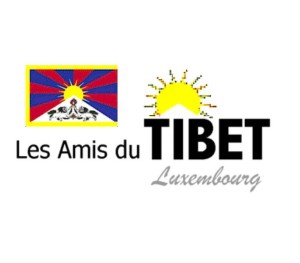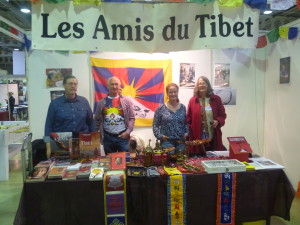 Les Amis du Tibet, Luxembourg is active in India and Nepal, particularly in development cooperation through both the sponsorship of Tibetan children and infrastructure and healthcare projects. The aim of these activities is to defend and safeguard the Tibetan language and culture, which are under threat inside Tibet. Tibetan children of school age flee into exile and, risking their lives, cross the Himalayas so that they can be educated within their own culture. Sponsoring children means that their expenses are paid at schools providing a Tibetan education. Building the infrastructure means that the students in exile can be more easily accommodated and that the education offered to them can be improved. Assistance with healthcare is vital for the Tibetans, who do not have adequate means to provide for their own care and are not used to the climate and illnesses of their host country. Through these different support measures, we are trying to encourage the young Tibetans in exile to have a better appreciation of the Tibetan culture. In their turn, they will be able to pass their learning on to future generations.
Les Amis du Tibet, Luxembourg is active in India and Nepal, particularly in development cooperation through both the sponsorship of Tibetan children and infrastructure and healthcare projects. The aim of these activities is to defend and safeguard the Tibetan language and culture, which are under threat inside Tibet. Tibetan children of school age flee into exile and, risking their lives, cross the Himalayas so that they can be educated within their own culture. Sponsoring children means that their expenses are paid at schools providing a Tibetan education. Building the infrastructure means that the students in exile can be more easily accommodated and that the education offered to them can be improved. Assistance with healthcare is vital for the Tibetans, who do not have adequate means to provide for their own care and are not used to the climate and illnesses of their host country. Through these different support measures, we are trying to encourage the young Tibetans in exile to have a better appreciation of the Tibetan culture. In their turn, they will be able to pass their learning on to future generations.
 In parallel, in Luxembourg, activities are organised by the NGO to raise awareness in order to bring the Tibetan culture to life outside India and Nepal and to inform the people of Luxembourg of the stakes as far as safeguarding that cultural heritage is concerned. Tibetan culture and education are based on principles of non-violence, respect for nature, altruism and sharing which are very inspiring for Western societies in general and the Luxembourg public in particular. This is borne out by the attendance at the conferences and other information sessions organised in previous years. Respect for cultural rights is essential for the survival of a people. That topic will be covered in the NGO’s activities to raise awareness with the Luxembourg public. Cultural rights have been recognised by the UN in Article 22 of the Universal Declaration of Human Rights.
In parallel, in Luxembourg, activities are organised by the NGO to raise awareness in order to bring the Tibetan culture to life outside India and Nepal and to inform the people of Luxembourg of the stakes as far as safeguarding that cultural heritage is concerned. Tibetan culture and education are based on principles of non-violence, respect for nature, altruism and sharing which are very inspiring for Western societies in general and the Luxembourg public in particular. This is borne out by the attendance at the conferences and other information sessions organised in previous years. Respect for cultural rights is essential for the survival of a people. That topic will be covered in the NGO’s activities to raise awareness with the Luxembourg public. Cultural rights have been recognised by the UN in Article 22 of the Universal Declaration of Human Rights.
Français: Active en Inde et au Népal, Les Amis du Tibet, Luxembourg participent à la coopération au développement à travers le parrainage d’enfants tibétains ainsi qu’à travers des projets d’infrastructure et de prévention en matière de santé. Ces actions sont réalisées dans le but de défendre et de sauvegarder la langue et la culture tibétaine, qui sont menacées au Tibet. Des enfants tibétains, en âge de scolarité, partent en exile et traversent l’Himalaya au péril de leur vie afin de pouvoir suivre un enseignement propre à leur culture. Le parrainage d’enfants permet de prendre en charge leurs frais de scolarité dans des établissements prodiguant un enseignement tibétain. La construction d’infrastructure permet de faciliter l’accueil des étudiants en exile et d’améliorer l’enseignement fourni. Enfin, la prévention en matière de santé est essentielle auprès des Tibétains qui ont peu de moyens pour se soigner et ne sont pas habitués au climat et aux maladies de leur nouveau pays d’accueil. Par ces différents soutiens, nous visons une meilleure appropriation de la culture tibétaine par les jeunes tibétains en exil qui pourront, à leur tour, transmettre leurs enseignements aux générations futures.
Parallèlement, au Luxembourg, des actions de sensibilisation sont organisées l’ONG dans le but de faire vivre la culture tibétaine au-delà des frontières indiennes et népalaises et de sensibiliser les Luxembourgeois aux enjeux de la sauvegarde de cet héritage culturel. La culture et l’enseignement tibétains sont basés sur des principes de non-violence, de respect de la nature, d’altruisme et de partage qui sont particulièrement inspirants pour les sociétés occidentales, en générale, et pour le public luxembourgeois, en particulier. Il suffit de voir la fréquentation des conférences et autres séances d’initiation organisées les années précédentes. Le respect des droits culturels est essentiel pour la survie d’un peuple. Cette thématique sera abordée dans les actions de sensibilisation de l’ONG auprès du public luxembourgeois. Le droit culturel a été reconnu par l’ONU, article 22 de la Déclaration Universelle des Droits de l’Homme.